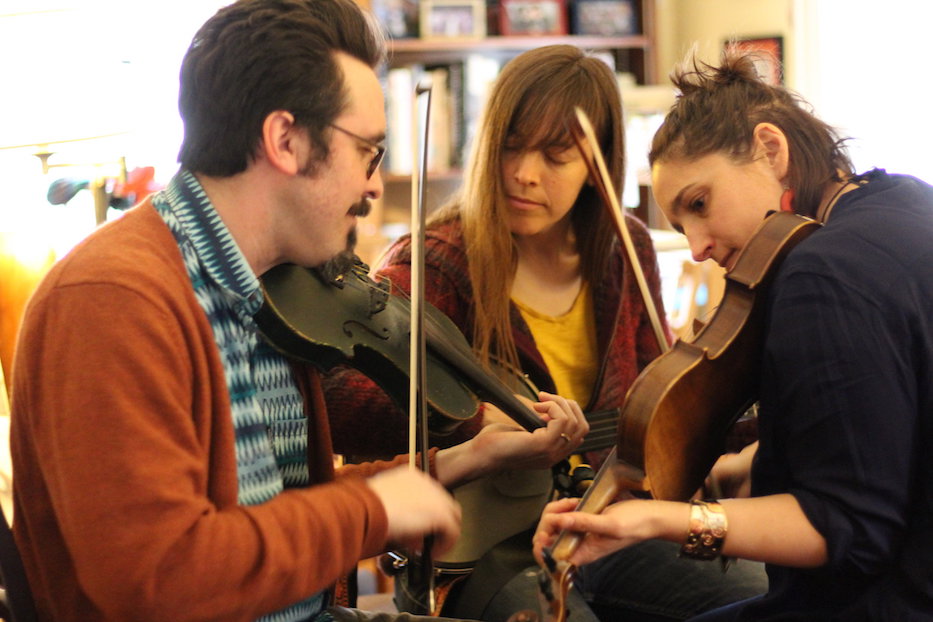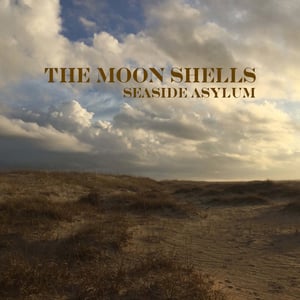
Cafe Nine | Music | Arts & Culture

| The group rehearsing at Slattery's home earlier this year. Lucy Gellman Photo. |
The beginning of “Firework” is all it takes for the listener to want to stay a while. Banjo plays the tune in, looping and light. From a bed of strings, Brian Slattery coasts over the music, his voice blazing but somehow unbothered. Palms clap right on time. It’s warm, like someone has left the porch light on for that neighbor trying to make it home.
I'm walking on the bridge over the river/Soon I'll be there
And the mayflies gather 'round on the muddy ground/In the humid air
And the hours are getting longer every day/Feels like the sun will never set
And I want to jump into that hazy horizon/I just haven't yet
“Fireworks” is the first track on Seaside Asylum, the first album from the still-evolving project of Maggie Shar, Brian Slattery, Laura Murawski, Molly Merrett, and Charlie Shaw known as The Moon Shells. Written last year by Shar and Slattery and released in April of 2019, the album is a happy marriage of Appalachian mastery, experiment, and witty, often endearing lyrics that charm the pants (or, maybe more aptly, the flannel) right off their listener.
Members of the group will be playing from the album on Nov. 24 at Cafe Nine, opening for Lula Wiles. Tickets and more information are available here.
The Moon Shells began in 2018, three years after Shar, Slattery and Murawski met through the Appalachian fiddle community and the annual string band festival known colloquially as Clifftop. By last year, they had played together multiple times, often improvising as a few notes turned into a round, blooming old time jam.
In 2018, Slattery asked Shar if she’d ever tried her hand at writing lyrics. The two started bouncing them back and forth via email, teasing out melodies after the fact or sometimes writing with an old time tune in mind. After one song inspired by the old time standard “Sally Coming Through The Rye,” they wrote another. And then another.
 It was a co-creative format that made sense: the two live over an hour away from each other in New England. Slattery lives in Hamden, where he teaches, does freelance work, and is arts editor for the New Haven Independent. Shar is based in East Hampton, Mass., where she teaches independently, tours as a musician, and works with the educational initiative Little Roots.
It was a co-creative format that made sense: the two live over an hour away from each other in New England. Slattery lives in Hamden, where he teaches, does freelance work, and is arts editor for the New Haven Independent. Shar is based in East Hampton, Mass., where she teaches independently, tours as a musician, and works with the educational initiative Little Roots.
“It was fun,” Shar said in a recent phone interview. “For me, it actually worked really well to do it long distance, because it gave me some time to think. Brian would send me a verse, and then on my dog’s walk I’d have time to chew on stuff by myself, which I find helpful for the creative process.”
When they realized they had enough for an album, they tracked each piece for multiple instruments. Murawski came on board, joined by other musicians. After close to a year of work, the album came out earlier this year. While Shar said some listeners assume that Slattery has written more of the lyrics—a trend that’s not uncommon in old time, and music more generally—she also said she and fellow members are quick to shut that perception down.
From that first listen, Seaside Asylum feels aptly named. It submerges the listener in banjo, fiddle, guitar, bass and winning vocals until the instruments swish around one’s head like warm, bathlike seawater. In “Firework,” for instance, Slattery calms the listener even as he marauds, lulling them into a sort of cozy trance with the hook. Vocals rise in the background, a sort of cushion:
Where I'm going I can't tell you
Where I'm going I don't know
Where I'm going I can't tell you
I just have to go
Much later, in “New Year’s Day,” he is back at it, wandering like a tumbleweed with twang in his voice and a few hundred bucks to his name. The song is buoyant and rudderless but also candid: exposition sprawls, hands clap, triangle turns into a tinkling heartbeat. Maybe, as he sings, the narrator truly will “never be lost/and never be found,” and that’s kind of okay.
Each song has this kind of charm, lyrics often so vivid one can almost see them. In “Don’t Go,” fiddle wails with intense longing, Shar's vocals steady and then pining as they come in to meet it. It feels like something familiar—a nod to Dirk Powell’s “Waterbound,” maybe—but also something of its own. So too in “The Tide,” a kind of ballad that follows a magnetic ebb and flow not unlike its namesake.
Some works have no words at all, and the album is better for it. In the title track, written at Clifftop last year, the fiddles are a burst of sunlight, splitting into tiny, bright particles as they drip over banjo like old friends talking to each other. In “Six Miles,” musicians close the album just as they have opened it, letting their instruments have the final say.
Fiddle dips and climbs gradually over banjo and guitar, a sort of loop that still makes time for tinny phrases that sing out like steel pan. Listeners are transported by pieces like this: it’s impossible to listen to these songs without seeing a cluster of friends together on the well-stomped grass somewhere, jamming together for the first time in months.
Since releasing the album, several members of the group also have also recorded and released a second album, Screech Plank, available at The Moon Shells’ website. This fall, they’ve been honing their repertoire in multiple shows across the northeast. They come to New Haven later this month.
“I think we’re building momentum,” she said. “We’re still a new band. So that’ll take time.”
For more information on The Moon Shells, find them on Facebook, Bandcamp, or at their Website.

